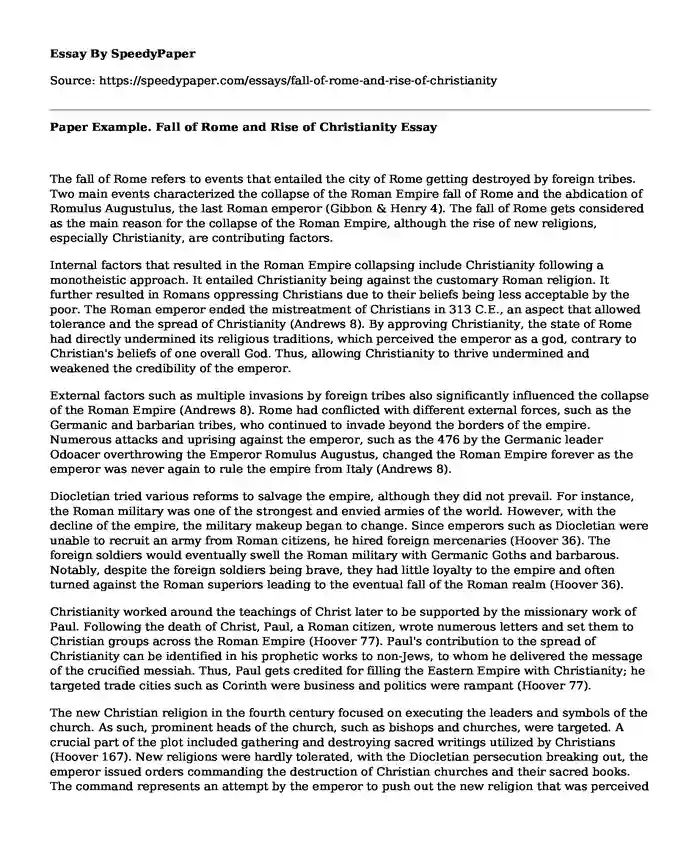
| Type of paper: | Essay |
| Categories: | Christianity Roman Empire |
| Pages: | 3 |
| Wordcount: | 694 words |
The fall of Rome refers to events that entailed the city of Rome getting destroyed by foreign tribes. Two main events characterized the collapse of the Roman Empire fall of Rome and the abdication of Romulus Augustulus, the last Roman emperor (Gibbon & Henry 4). The fall of Rome gets considered as the main reason for the collapse of the Roman Empire, although the rise of new religions, especially Christianity, are contributing factors.
Internal factors that resulted in the Roman Empire collapsing include Christianity following a monotheistic approach. It entailed Christianity being against the customary Roman religion. It further resulted in Romans oppressing Christians due to their beliefs being less acceptable by the poor. The Roman emperor ended the mistreatment of Christians in 313 C.E., an aspect that allowed tolerance and the spread of Christianity (Andrews 8). By approving Christianity, the state of Rome had directly undermined its religious traditions, which perceived the emperor as a god, contrary to Christian's beliefs of one overall God. Thus, allowing Christianity to thrive undermined and weakened the credibility of the emperor.
External factors such as multiple invasions by foreign tribes also significantly influenced the collapse of the Roman Empire (Andrews 8). Rome had conflicted with different external forces, such as the Germanic and barbarian tribes, who continued to invade beyond the borders of the empire. Numerous attacks and uprising against the emperor, such as the 476 by the Germanic leader Odoacer overthrowing the Emperor Romulus Augustus, changed the Roman Empire forever as the emperor was never again to rule the empire from Italy (Andrews 8).
Diocletian tried various reforms to salvage the empire, although they did not prevail. For instance, the Roman military was one of the strongest and envied armies of the world. However, with the decline of the empire, the military makeup began to change. Since emperors such as Diocletian were unable to recruit an army from Roman citizens, he hired foreign mercenaries (Hoover 36). The foreign soldiers would eventually swell the Roman military with Germanic Goths and barbarous. Notably, despite the foreign soldiers being brave, they had little loyalty to the empire and often turned against the Roman superiors leading to the eventual fall of the Roman realm (Hoover 36).
Christianity worked around the teachings of Christ later to be supported by the missionary work of Paul. Following the death of Christ, Paul, a Roman citizen, wrote numerous letters and set them to Christian groups across the Roman Empire (Hoover 77). Paul's contribution to the spread of Christianity can be identified in his prophetic works to non-Jews, to whom he delivered the message of the crucified messiah. Thus, Paul gets credited for filling the Eastern Empire with Christianity; he targeted trade cities such as Corinth were business and politics were rampant (Hoover 77).
The new Christian religion in the fourth century focused on executing the leaders and symbols of the church. As such, prominent heads of the church, such as bishops and churches, were targeted. A crucial part of the plot included gathering and destroying sacred writings utilized by Christians (Hoover 167). New religions were hardly tolerated, with the Diocletian persecution breaking out, the emperor issued orders commanding the destruction of Christian churches and their sacred books. The command represents an attempt by the emperor to push out the new religion that was perceived to be undermining the Roman civilization. As such, Christians were faced with great persecution (Hoover 167).
In conclusion, the fall of the Rome Empire aided by Christianity characterized the collapse of the Roman Empire. Acceptance of Christianity in Rome led to the undermining of the Roman Emperor, who was considered a god. Other reasons resulting in the fall of the empire include foreign invasions by barbarian tribes. It included expansion of the military using foreign soldiers that would later turn against the emperor.
Works Cited
Andrews, Evan. "8 reasons why Rome fell." History, 2014.
http://www. history. com/news/history-lists/8-reasons why-Rome-fell (8).
Gibbon, Edward, and Henry Hart Milman. The decline and fall of the Roman Empire. Vol. 3. New York: Modern Library, 2003.
https://www.campbellmgold.com/archive_definitive/dafotre_2_gibbon_1789.pdf
Hoover, Jesse A. The contours of Donatism: theological and ideological diversity in fourth-century North Africa. Diss. 2008.
https://baylor-ir.tdl.org/handle/2104/5145.
Cite this page
Paper Example. Fall of Rome and Rise of Christianity. (2023, May 09). Retrieved from https://speedypaper.net/essays/fall-of-rome-and-rise-of-christianity
Request Removal
If you are the original author of this essay and no longer wish to have it published on the SpeedyPaper website, please click below to request its removal:
- Religion Essay Example: Letter from Luther to Anyone During The Reformation
- Historical Essay Sample: Rwandan Genocide Facts
- Religion Essay Sample on Modern Challenges in Islam
- Free Essay Sample: A Revolutionary Nation
- Presentation Essay Example: "A Look Behind the Veil"
- Free Essay Example - The Sad Stories Behind The LeftOvers by Erin Whitney
- Meaning of the Name Jesus - Free Paper Sample
Popular categories




